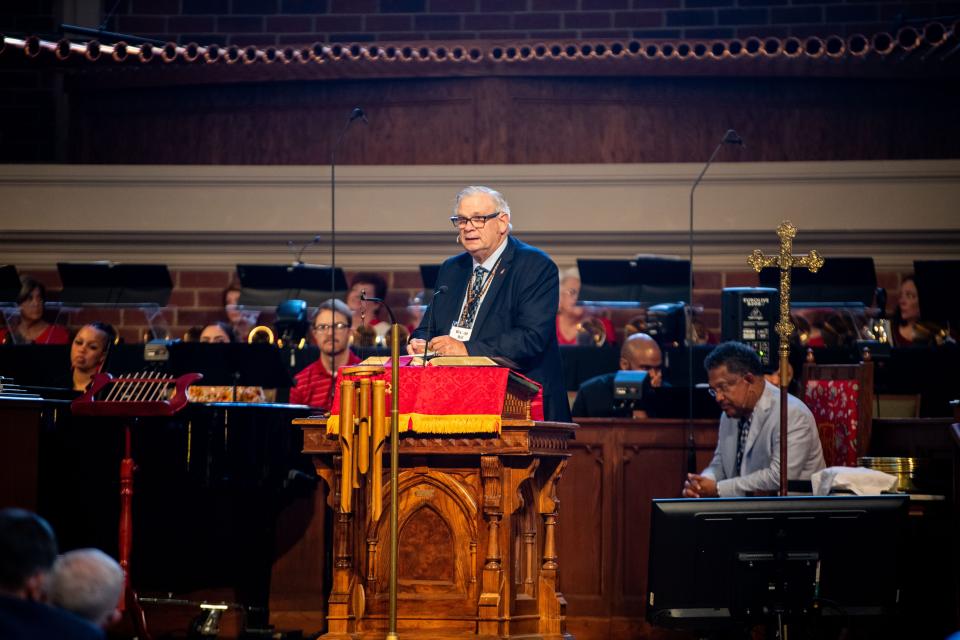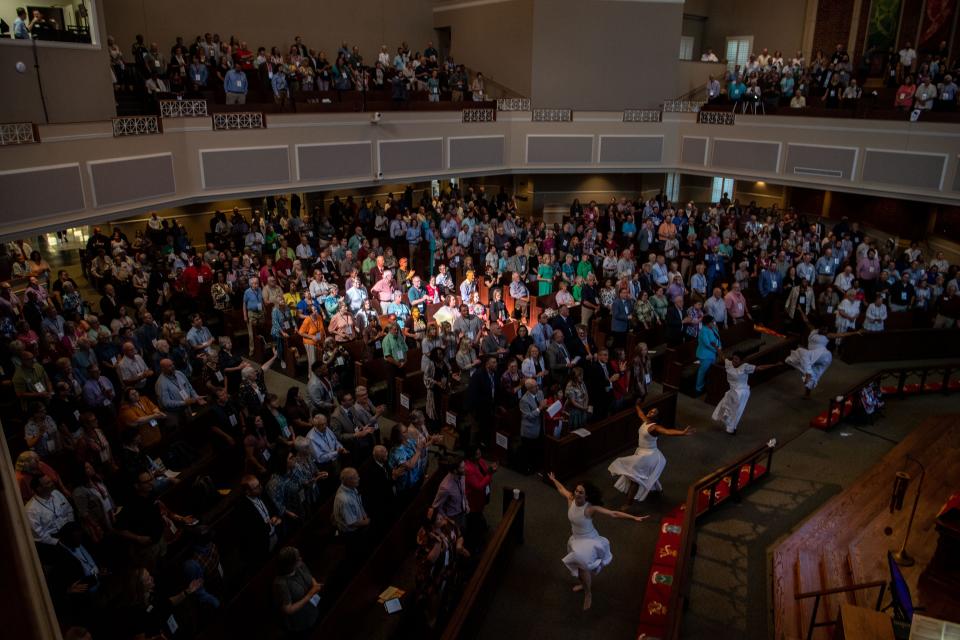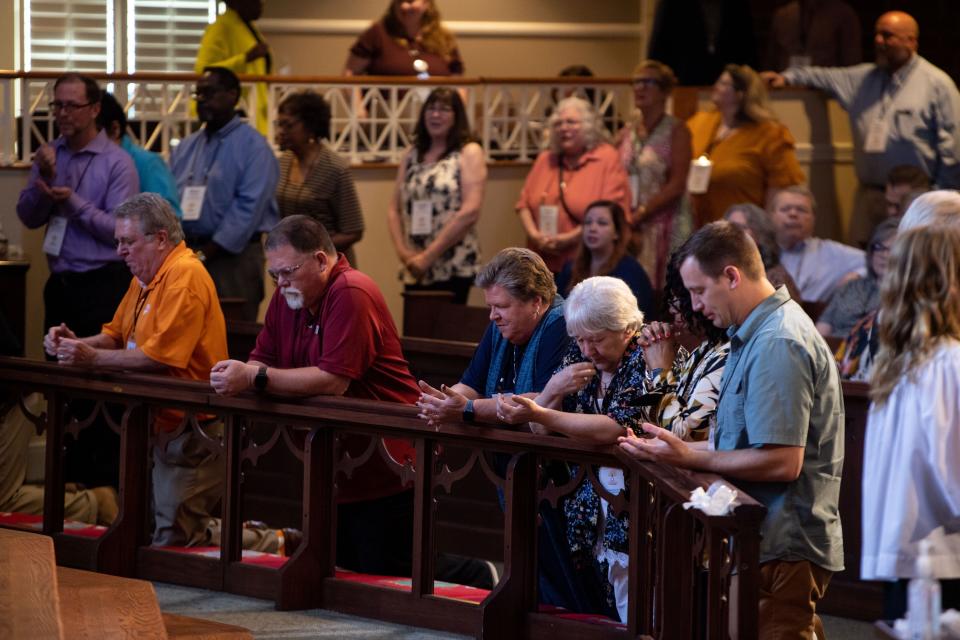Outgoing Tennessee bishop Rev. Bill McAlilly’s prayer for area United Methodists is they pursue “reorientation” in a season of upheaval and uncertainty.
“I would love to say the disorientation is gone but it’s not,” McAlilly said Wednesday in sermon during the regional United Methodist Church legislative assembly for the Tennessee-Western Kentucky Conference in Murfreesboro. “So, buckle up.”
In his last sermon to the legislative body before he retires in September, McAlilly focused on the ideas of “orientation, disorientation and reorientation” as a framework for how the local UMC should respond to a historic splintering in the denomination.
McAlilly’s sermon and other moments throughout the three-day legislative assembly at First UMC Murfreesboro previewed the future operations and spirit with which local United Methodists partner with one another. That forecast is one of greater reliance on lay volunteers to lead ministries and openness toward collaboration among churches across the ideological spectrum.
“The church’s task is not to liberalize conservatives or conservatize liberals. That’s someone else’s job,” the Rev. Davis Chappell, senior pastor of Brentwood UMC, told conference delegates on Tuesday. “Stick to the essentials so that we can live together in harmony.”
Drawing from his personal experience at Brentwood UMC — a prominent suburban church comprised of many centrist and conservative-leaning parishioners — and the story of its response to a push for churches to leave the UMC, Chappell’s message to the Tennessee-Western Kentucky delegates was a base note for much of the discourse at the legislative assembly.
More than 7,500 U.S. churches left the UMC, or disaffiliated, between 2019-2023 following disagreements over church policy and theology, including dealing with LGBTQ+ rights. Many of the churches joined a more conservative breakaway denomination called the Global Methodist Church. Among those total disaffiliations, 360 churches were from the Tennessee-Western Kentucky Conference, which encompasses all but East Tennessee.
Still, some conservative and many centrist churches in the region remained United Methodist alongside other staunchly progressive congregations largely in Nashville. This ideological array is part of a push for a “big tent” denomination, a major theme of the worldwide UMC General Conference meeting in April. At the denomination’s top legislative assembly in Charlotte, the UMC General Conference reversed anti-LGBTQ+ restrictions and approved a plan to restructure the denomination.
In the wake of those policy changes, United Methodists are now defining at the local level what it means to be practically committed to that “big tent” ideal. A first step for the Tennessee-Western Kentucky Conference was acknowledging the church’s hurtful treatment of LGBTQ+ people through a resolution on “confession and reconciliation.”
The resolution, ultimately supported by 84% of delegates, calls for “a more inclusive, affirming, and restorative church that seeks to heal historic harms done to the Black, Brown, LGBTQIA+, immigrant, indigenous communities, and women.”
That acknowledgement is important “for a lot of us, especially as someone who is LGBT and are seeking a place in this church when so many others who have faced historic harms by the Methodist movement,” said delegate Charles Uffelman, who co-authored the resolution, during a Wednesday floor debate. “Confession frees us to build the church that serves everybody.”
More from UMC General Conference: United Methodists took historic steps toward inclusion but ‘big tent’ work has just begun
‘On the other side of death’
Amid the ongoing evolution in area United Methodists’ collective values, McAlilly and his team have sought to manage the administrative upheaval of the splintering in the UMC as proactively as possible.
“It’s taken all the faith God could muster up and put in me these last few years to make it, frankly,” McAlilly said in his sermon.
Even before the COVID-19 pandemic and disaffiliations, McAlilly, who began his tenure in 2012, faced a daunting responsibility: merge the Tennessee and Memphis regional (called “annual”) conferences. The work took the better part of a decade and required the conference to consolidate staff and rely more on lay volunteers, something other UMC regions would later grapple with as disaffiliations picked up starting in 2019.
“When I got here 12 years ago, we were oriented toward a different church than the one we are now serving,” McAlilly said. “That church is no longer here.”
The Tennessee-Western Kentucky Conference lost about 38% of its total churches in 2019 to disaffiliations, according to the Lewis Center for Church Leadership, a research center out of the UMC-affiliated Wesley Theological Seminary in Washington D.C. Those disaffiliations accounted for about $2.2 million in annual revenue the conference received from church giving, John Pearce, chair of the conference’s council on finance and administration, said in a June 18 report to delegates. The conference has recouped some of those losses through exit fees that disaffiliating churches were required to pay, totaling about $12 million for the Tennessee-Western Kentucky Conference, Pearce said.
Also, despite McAlilly’s vocal opposition to disaffiliation and unlike other annual conferences that wound up in heated court battles, the Tennessee-Western Kentucky Conference mostly avoided heightened conflict with disaffiliating churches. In the meantime, the conference prioritized new programs such as The Vine UMC, a hybrid church initiative.
Though it’s become a resource to parishioners in a variety of contexts, the conference launched The Vine primarily to “support for those who have lost their churches due to disaffiliations,” the Rev. Erin Beasley said in a June 18 report to delegates. Some churches' decision to disaffiliate, a process requiring a two-thirds majority vote, split congregations in half or caused anti-disaffiliation members to leave on their own. A goal for The Vine in its second year is to create a liturgy guide for church gatherings in which an ordained United Methodist minister isn’t present.
To put an even finer point on his sermon on the role of the church in the cycle of disorientation and reorientation, McAlilly talked about his near fatal car crash in August 2022 and a support system of United Methodist staff and pastors that immediately sprang up.
A member of McAlilly’s staff who speaks Spanish was the first to receive a call from a Spanish-speaking first responder, who was calling recent contacts on McAlilly’s phone. That initial call started an information chain, including to a friend of McAlilly’s who raced to the hospital as first responders transported the bishop from the site of the accident on Interstate 24. Simultaneously, Chappell called a Brentwood UMC parishioner who works for Tennessee Highway Patrol to get real-time information to McAlilly’s wife and son.
“We can find our way to reorientation and the church has provided a framework for that,” McAlilly said. Just as he learned from his own near-death experience, McAlilly said the current moment of recovery and reimagining throughout the UMC is not all that different.
“Reorientation on the other side of death. We have a name for that in the church, know what’s it called?” McAlilly said. “It’s resurrection.”
Liam Adams covers religion for The Tennessean. Reach him at ladams@tennessean.com or on Twitter @liamsadams.
This article originally appeared on Nashville Tennessean: TN United Methodists tackle cooperation amid policy, leadership change


